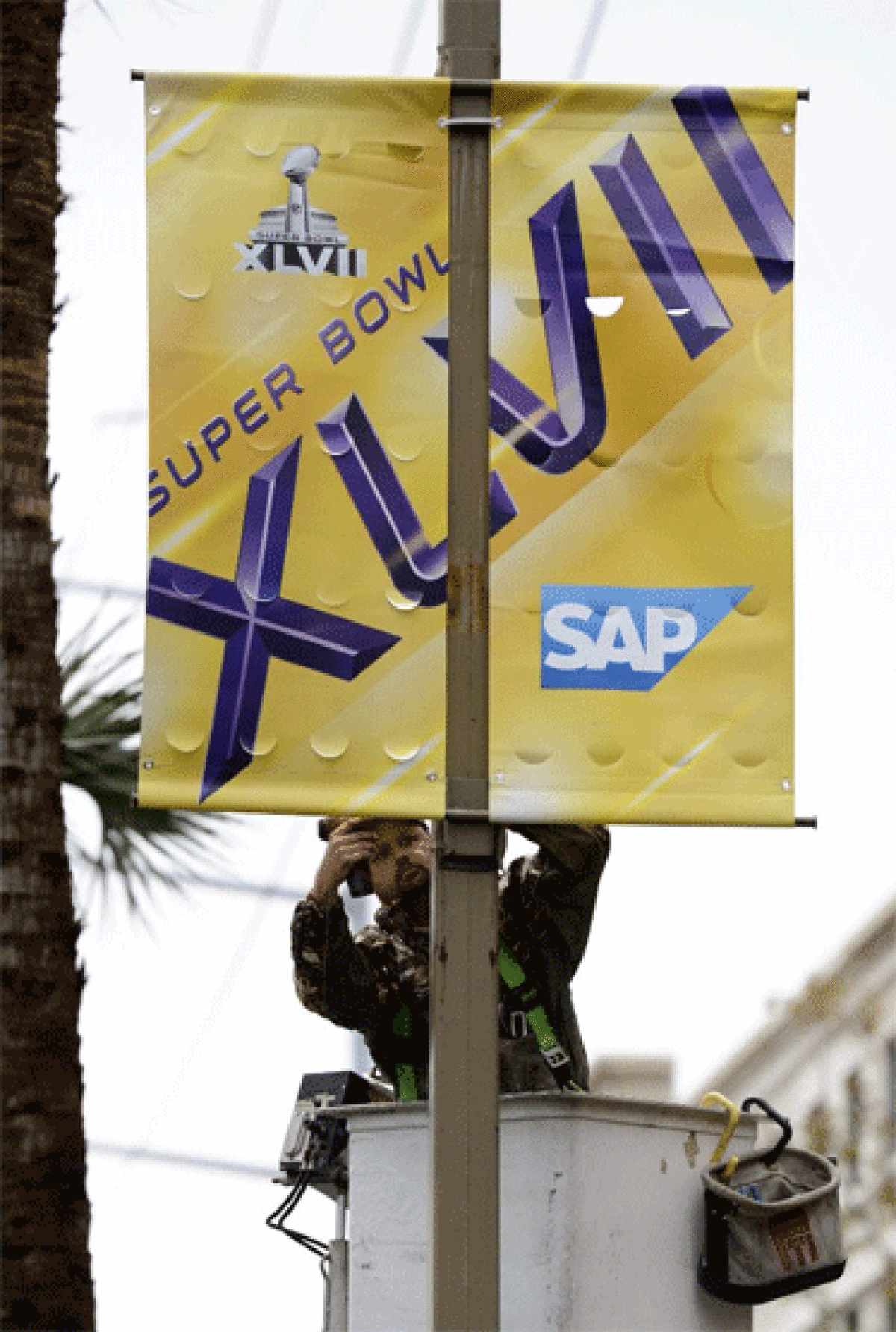What’s a Super Bowl party without cable?

- Share via
Are Super Bowl parties a thing of the past? Hungry fans certainly hope not. We could be headed in that direction, though, if the price of cable and food keep climbing at the current insane rates.
When Time Warner Cable’s deal with the Lakers caused my cable bill to go up, I shrugged it off and agreed with The Times’ editorial board:
“If history is any guide, those customers will grumble about the higher monthly fees but will pay anyway. The willingness of pay TV subscribers to pay more every year is what enables cable networks to offer professional sports teams and leagues increasingly lavish sums for the exclusive rights to air their games. As a result, major sports franchises have been gradually fading from free TV.”
When I learned that Time Warner Cable was increasing its rates again to help cover its deal with the Dodgers for a baseball channel, I decided it was time to pull the plug.
Times business columnist David Lazarus details the hikes coming our way:
Time Warner subscribers are being notified in their latest bill that the monthly cost of basic cable service will jump 8.2%, or almost four times the annual rate of inflation as of October 2012 -- to $72.50 from $67.
The cost of receiving local channels will climb 17.6%, to $20 from $17 a month.
Like to skip commercials by recording shows on your digital video recorder? That monthly cost will rise for many customers 18.6%, to $12.99 from $10.95.
If you have other services, such as Internet, you can expect your monthly cable programming cost to rise $3 to $5 after existing promotional rates expire, Time Warner says.
Way to show customer appreciation, TWC.
Instead of charging us more for this baseball channel, the company should have used the deal as an opportunity to keep its customers. That’s right. Prices aren’t just going up ‘cause of the company’s sports deals; they’re also increasing to make up for lost business. I mean, really: Who needs cable when you can watch everything you want just as easily -- and legally -- on the Internet for a fraction of the price? Cable’s allure is its convenience. It no longer seems as convenient when it screws up your household’s bottom line.
Sure, sports fans will endure TWC’s rate hikes; games are one of the few things people will pay to watch in real time. But after another rate hike or two, I’m sure a lot of these customers will migrate too -- to the free TVs at sports bars canvassing L.A.
Meantime, food prices are also climbing. Because of the 2012 Midwest drought that demolished corn and soy crops, there was less feed for chickens, meaning chicken production slowed. The result: A chicken wing shortage. From CNN’s Eatocracy:
David Harvey, an agricultural economist and specialist in poultry at the United States Department of Agriculture, […] said that the average wholesale price of wings in the Northeast market is up 26% to $1.90 a pound in December, an increase from $1.51 this time last year. In supermarkets across America, that translates to an average of $1.48 per pound, according to a recent Consumer Price Index, up 10.6% from what it was a year ago, according to Bureau of Labor and Statistics economist Ken Stewart.
And it’s not just wings. Beef and pork belly prices have gone up too, says Bruce Reinstein, vice president of strategic development and sourcing for Boston-based Consolidated Concepts. Worse, because of poor weather, Reinstein says the cost of tomatoes has gone up 40%. Luxury prices for salsa, anyone?
Of course, prices are going to fluctuate. Unlike cable, though, customers have the opportunity to pick and choose what they’re willing to pay for. And next year, personal budgets may not include money for chicken wings, much less cable on Super Bowl Sunday. And let’s be honest: Rabbit ears won’t cut it on game day.
Rather than risking its customer base (and the fate of an American tradition), TWC can lead the charge toward change that would benefit us and it.
“As it stands, the industry is hostage to the whims of channel providers, which have no incentive to change things,” writes Lazarus, who argues for an a la carte-style cable program that allows customers to pick and choose which channels they want to pay for. “As I’ve written before, cable and satellite companies should apply their considerable lobbying clout to persuading lawmakers that it’s not in consumers’ interest to have to pay for products they don’t need or desire. Otherwise, the way things are going, there won’t be enough customers left to support the pay TV industry. And that’s not in anyone’s interest.”
ALSO:
Photo gallery: Ted Rall cartoons
Shotgun weddings good, gay marriages bad
Follow Alexandra Le Tellier on Twitter @alexletellier
More to Read
A cure for the common opinion
Get thought-provoking perspectives with our weekly newsletter.
You may occasionally receive promotional content from the Los Angeles Times.






